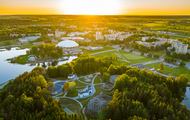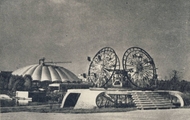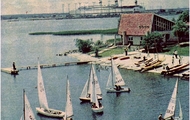After the third ice age, the current territory of Elektrėnai was flooded by glacial melt waters. Over time, the water moved, leaving clay and sand alluvium in the highlands, and several lakes in the valleys. Thus, after three hundred years, Anykštos, Pukinnos, Jagudis and several smaller lakes remained. People have been talking about the mentioned lakes since the Stone Age. This is evidenced by the burial mounds of Alynka, Perkūnakiemi, and Gojaus explored in these surroundings. Archaeological excavations show that one of the Jotving tribes lived here at the beginning of our era. In the early years of the existence of the Lithuanian state, the old inhabitants of the Elektrėnai area found themselves under the influence of one of the most important administrative and political centers - Trakai. The great roads of that time to Vilnius and Traky passed through these places, which were often used by the troops of the Teutonic Order. In 1348, a dozen kilometers from the current city of Elektrėnai, by the river Streva, a big battle took place in which thousands of people died, including Gediminas' son Narimantas. So our ancestors were witnesses of important events. People settled near rivers and lakes because they needed water first. The selected location needed a name. The old Lithuanian religion, natural phenomena, historical events, and the names of famous people helped here. Relic of Paganism - Thunderbirds. This is the territory where the Lithuanian Power Plant is located today.
People have been living in the current territory of the city of Elektrėnai and its surroundings for a very long time, although the city itself is one of the youngest in Lithuania. From the 14th century, the areas of Elektrėnai were under the influence of the Duchy of Trakai, from 1413 – Trakai Voivodeship, after the restoration of Lithuanian independence (1918) – passed from Trakai County to Kietaviškiau County, later to Vievi County and Vievi District (June 20, 1950). The city of Elektrėnai, which had already been established, belonged to the Trakai district, and in 2000, after the establishment of the municipality of Elektrėnai, it became its center. Electric constructions have brought great changes. The body of water, now called Elektrėnai Lagoon, was created by damming the Streva River. In 1961, the water began to rise in the dam, merging as many as eight lakes and small lakes: Anykšta, Pukina, Jagudė, Jagudėlė, Dumbliuka, Nendrynėlė, Syšvanta and Šyšvantaitis. The old islands, even the famous Stork Colony, the largest homeland of white travelers in Europe, were under water. New islands appeared: Didžioji, Baubii, Garnii, Kiri, Miškinė, Zalioji, Kalvotoji... Kakliniškii, Perkūnakiemi, Šarkinė, Anykščiai, Raistinė, Lekavičių, Mažiklė, Petravičių, Alinka, Runga villages, including more than 140 homesteads. moved, appeared under water. The names of these villages are engraved on one of the sculptures of the Elektrėnai Sculpture Park. in 1961 in the spring, construction of a permanent settlement began, the city was designed by B. Kasparavičienė and K. Bučas.
Personalities
- Pranas Noreika - the title of honorary citizen of Elektrėnai municipality was awarded for special services to the city of Elektrėnai.
- Stasys Žlibinas - the poet was awarded the title of honorary citizen of the municipality of Elektrėnai for popularizing the city of Elektrėnai.
- Monsignor Jonas Sabaliauskas - the title of honorary citizen of the municipality of Elektrėnai was awarded for mobilizing the community for active activities.
- Dainius Pulauskas - a composer who created more than 1000 arrangements for symphony orchestra, brass orchestra, big band, chamber orchestra, string quartet, jazz group, folklore ensemble.
- Gintaras Rinkevičius - one of the most famous conductors in Lithuania today, winner of the National Prize Gintaras Rinkevičius, LMTA professor, founder of the Lithuanian State Symphony Orchestra, artistic director and chief conductor.
- Joroslavas Cechanovičius - Šiauliai city artistic director and chief conductor of the big band of the "Saulė" concert institution.
- Tadas Šumskas - composer, arranger, conductor, professor. Awarded the medal of the Order "For Services to Lithuania" and other awards. Honorary citizen of Elektrėnai municipality (the title of honorary citizen was granted by the decision of the Elektrėnai municipality council on 06/29/2022 No. VI. TS-136)
- Donatas Vēželis - professional Lithuanian sports dance dancer. Gold medal winner of the European Show Show Standard Dance Championship in Vienna.
- Darius Kasparaitis - one of the most titled Lithuanian ice hockey players.
- Dainius Zubrus is the only Lithuanian playing in the North American National Hockey League.
- Martynas Gudelis - a writer who published the novel "Skynimai dega", in which he described the fire that destroyed half of the village of Gilučiai.
- Juozas Kralikauskas - writer from the diaspora, author of historical novels.
- Juozas Kundrotas - writer, born and raised in the vicinity of Gilučiai.
- Sofija Pšibiliauskienė - Lazdynų Pelėda - writer, wrote the short story "Mistake" while living in Vievi.
- Algis Viktoras Mekas - honorary citizen of Elektrėnai Municipality (the title of honorary citizen was granted by the decision of the Elektrėnai Municipality Council of 22/02/2023 No. VI.TS-13), Lithuanian energy engineer, Honorary Energetics Engineer, who worked as chief engineer in one company for the longest time .
- Rimvydas Stankevičius is a poet, prose writer, essayist, born in Elektrėnai. The poet won the medal of the National Culture and Art Prize for the classical gene in contemporary poetry.
- The first inhabitants - people settled on the shores of Old Anykšta, Pukinina, Jagudis and several smaller lakes already in the Stone Age.
- 1348 The Battle of Streva - a dozen kilometers from the working-class Elektrėnai, near Streva, a huge battle took place in which several thousand Lithuanians died, including one of Gediminas's sons - Narimantas.
- in 1961 The creation of the city of Elektrėnai started - the coat of arms of Elektrėnai decided to depict a stylized lightning bolt and two eight-pointed stars, which symbolize the new city of Elektrėnai and the disappeared old villages.
- 1961-1962 The first school was established.
- 1962 House of Culture.
- 1962 Sports club "Energija" - the most popular sports: ice hockey, figure skating, sailing, judo, handball, checkers, chess, kayaking and canoeing, water skiing and bocce sports.
- 1965 Hospital
- 1976 Ice palace
- 2004 - 2007 Public library
- 1961 The Streva River was dammed during the construction of the Elektrėnai marios - thermal power plant. in 1961 when the water of the river began to rise, it flooded Anykšta, Jagudis and Puikinas lakes, which merged into a huge pond, now called Elektrėnai Lagoon.
- Mayor of Elektrėnai Municipality - Gediminas Ratkevičius
- Residents of Elektrėnai Municipality - 24,201 (2023)
- Area of the municipality (ha) - 50,900
- The municipality of Elektrėnai includes eight wards: Elektrėnai, Vievio, Semeliškių, Kietaviškii, Kazokiškii, Gilučių, Pastrėvii, Beizioni.
Traditional events
- Since 1968 - Jazz Youth - the first jazz festival "Youth 68" took place in Lithuania.
- The "Person of the Year" election - a celebratory evening organized every year - is awarded to the most deserving people of the municipality.
- Since 1971 "Running around the lagoon".
- Since 2012, the hike " Zhalio Velnio takais" - the hike is intended to honor Jonas Misiūnas, the commander of the partisans of the Great Kovo district - Green Devil, and the partisans of this district.
- Since 2015, Elektrėnai Rally - a rally that unites the most beautiful areas of the municipality and gathers a large number of people.
From author Gabrielius Lisauskas




